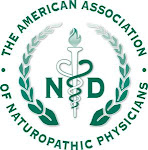By Louise N. Edwards, ND, LAc
AANP 2011 Vis Award Winner
Having been invited to write a post for the AANP blog (Thank you Mandisa), I logged in to see what other topics had been covered.
The most recent post by my dear friend Dr. Shiva Barton was titled, “Why is homeopathy dead?” I found this question startling and disturbing.
Once I read the post about how fewer naturopathic graduates are using homeopathy and the reasons why, it became clear to me what I wanted to write about, which is why I love homeopathy and the “slightly twisted” trail that brought me to this point. I am hoping that this will inspire some of you younger docs to lose the fear and embrace the therapy that I love the most!
To give some context, let me share a bit about my practice. I graduated from NCNM in 1988 and the Oregon College of Oriental Medicine (OCOM) in 1989. I’ve had a general family practice in Colorado where I occasionally see patients and now primarily teach naturopathic medicine at Bastyr and NUHS.
My practice is based on traditional naturopathic philosophy, always focusing on re-establishing the basis for health by correcting the underlying imbalances such as diet, hydration, sleep, exercise and mental state and then supplementing with other therapies. The therapies that I use include herbal medicine from both the western and Chinese traditions, nutrient supplements, hydrotherapy, acupuncture, manipulation, counseling, cell salts and homeopathy.
During my time at NCNM, we were only required to take 2 courses in homeopathy, both on acute prescribing. Unfortunately my instructor did not impress me with the value of the remedies, so I didn’t take any of the elective classes in homeopathy.
When I began my practice in Colorado, I occasionally prescribed homeopathy based on the acute prescribing I’d been taught in school. No prolonged histories or deep analysis just simple acute prescribing, such as Arnica for trauma, and I witnessed remarkable results! I saw profound, fast and clear responses to the remedies.
This happened so consistently I couldn’t ignore it. I began to regret that I hadn’t taken those electives because I was ill prepared to use this powerful medicine. I needed more training.
So I started studying, books and notes by George Vithoulkas and Dr. Eizyaga. I attended intensives with docs such as Drs. Paul Herscu, Robin Murphy and Rajan Sankaran. I went to conferences sponsored by the Homeopathic Academy of Naturopathic Physicians and National Center for Homeopathy.
During these years, I was exposed to many different types of prescribing: high potency, low potency, single doses, repeated doses, single remedies, combinations, families, constitutional, miasmas and more acute prescribing. I also encountered many strong opinions about which were the right ways to prescribe. Intriguingly, I found that most of these folks, prescribing in a diversity of ways, were having consistently good results. So, I experimented with all the methods, learning and refining my techniques of choosing remedies and dosing. I became ever more impressed with the phenomenal healing capacities of homeopathy. I witnessed significant pathology resolve and even more impressive to me, I observed significant and often deep seated psychological disorders resolved.
Practicing holistically, I’ve always focused on the patient’s state of mind as a central feature of their overall health. As I mentioned above, I do quite a bit of counseling. It is not uncommon for patients to tell me that they have had counseling, that they know what the problem is, the causes of their disturbance, that they have tried many times to change and that it “feels cellular” and they can’t seem shake it. This is where the correctly chosen remedy can work miracles. Literally, hundreds of times I have seen people’s state of mind transformed by the right remedy, freeing them from years of suffering. I keep hoping that the field of psychiatry will finally accept homeopathy because it will transform the practice.
For many years, there has rarely been a patient that gets out of my office without a remedy. Like Dr. Barton, I use it in combination with all the other therapies in my toolbox, including necessary pharmaceuticals (although these can often disrupt the remedy, so I have to use repeated doses). I do recommend to my students that when they are learning any therapy, that they use them singularly, so that they understand the effects of that herb, nutrient or remedy. However, once they have experience with each of them, then I encourage them to combine them, when appropriate, to optimize the treatment of each individual.
In all my years of practice, I’ve missed the remedy a few times. I’ve seen a few provings when I gave the wrong remedy for too long (which is easily corrected), but I have never witnessed harm and am so sad to hear that students are told this is a risk. If someone were to tell me that I could only use one therapy in my practice (in addition to basic nature cure) I would choose homeopathy, because in my experience, there is no other therapy that has such profound and broad effects. That’s why I love homeopathy.




